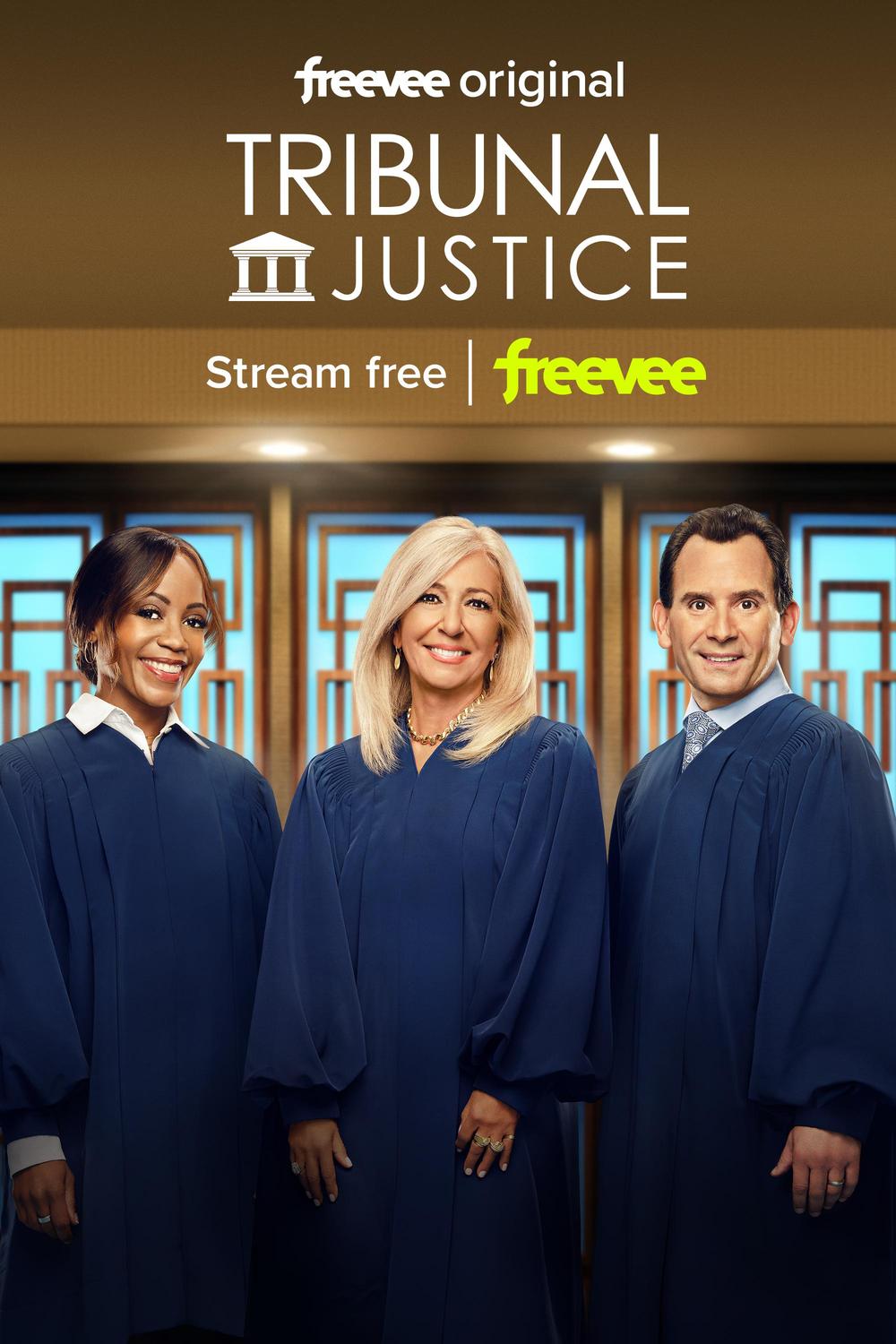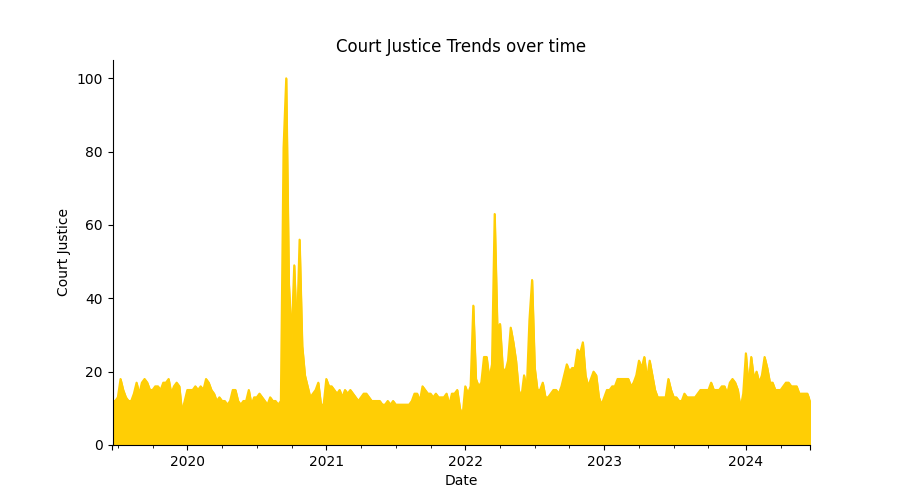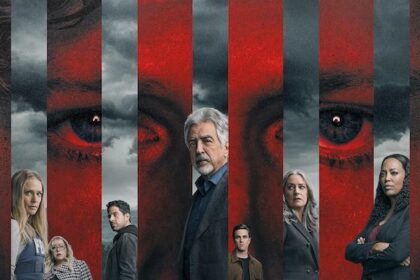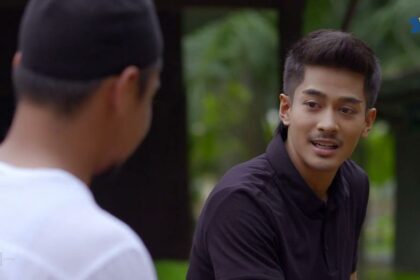
🪶 Story & Synopsis
“Tribunal Justice,” a captivating court show created by the renowned Judge Judy Sheindlin, has taken the legal television world by storm with its unique format and engaging content. Presented by a panel of three legal professionals, including Tanya Acker, Patricia DiMango, and Adam Levy, the show offers viewers a fresh perspective on real cases as they are adjudicated and debated in the bustling city of Los Angeles.
With its debut on Amazon Freevee on June 9, 2023, “Tribunal Justice” has quickly garnered a loyal following, drawing in audiences with its compelling cases and the insightful opinions of the esteemed judges. The show’s format, which features a $10,000 small claims court limit, sets it apart from other courtroom shows like “Judge Judy,” “Hot Bench,” and similar programs, making it a standout choice for legal drama enthusiasts.
As the first season unfolds, viewers are treated to a fast-paced and engaging look at the intricacies of the legal system, as well as the human stories behind each case. From contract disputes to landlord-tenant conflicts, “Tribunal Justice” offers a diverse range of cases that keep audiences on the edge of their seats, eager to see how justice will be served.
Behind the scenes, the show is helmed by a talented production team, with executive producers Sandra Allen, Scott Koondel, and the legendary Judy Sheindlin herself ensuring that each episode is a seamless blend of entertainment and legal insight. Filmed in the vibrant city of Los Angeles, the show captures the essence of the bustling metropolis, providing a dynamic backdrop for the riveting courtroom drama that unfolds on screen.
With its renewal for a second season, “Tribunal Justice” is poised to continue its success, offering viewers a front-row seat to the drama, emotion, and intrigue of the legal world. As the show’s popularity grows, so too does its impact on the genre, setting a new standard for courtroom television that keeps audiences coming back for more.
🧑 Cast & Crew
Chris Bourke
| Actor | Role |
|---|---|
| Non-union actors | Litigant |
💬 Reviews and feedback
Imagine a courtroom drama where the gavel seems more like a prop than an instrument of justice, where the judges might need a crash course in law rather than presiding over cases with authority. Welcome to the world of “Tribunal Justice,” a show that seems to have taken the term “scripted reality” to a whole new level.
As you dive into this legal circus, you can’t help but wonder if the cases are crafted by writers rather than real-life litigants. The judges, although seasoned from their time on Hot Bench, sometimes come across as more actors reading lines than legal experts making informed decisions.
While Judge Judy and her no-nonsense approach might be your go-to for authentic courtroom entertainment, “Tribunal Justice” might leave you questioning the authenticity of each ruling and every dramatic pause.
Plot and Themes:
- Plot: The show follows a trio of judges navigating through cases that seem more like theatrical performances than genuine legal disputes. Each episode presents scenarios that border on the absurd, leaving viewers wondering if they’ve stumbled into a parallel universe where courtroom decorum takes a back seat to sensationalism.
- Themes: While the theme of justice is central to the show, it often gets overshadowed by the spectacle of scripted cases and over-the-top reactions. The balance between entertainment value and legal integrity seems to tilt heavily towards the former, leaving purists of courtroom dramas scratching their heads in disbelief.
Acting and Characters:
In a world where authenticity should reign supreme, “Tribunal Justice” struggles to convince viewers of its genuine nature. The judges, despite their experience on Hot Bench, come across as performers reciting lines rather than arbiters of truth and fairness.
The lack of depth in character portrayal leaves much to be desired, with personas feeling one-dimensional and predictable. It’s almost as if the script takes precedence over genuine interactions and reactions, robbing the audience of truly investing in the characters’ journeys.
Direction and Production Design:
- Direction: The direction of “Tribunal Justice” seems to prioritize melodrama over substance. Scenes are orchestrated for maximum impact, often sacrificing realism for heightened tension and conflict. While this approach may cater to certain audiences seeking entertainment value, it falls short in capturing the essence of true courtroom dynamics.
- Production Design: The set design leans towards flashy aesthetics rather than understated elegance. The grandiosity of the courtroom setting sometimes overshadows the gravity of the cases being presented, creating a disconnect between form and function. Authenticity takes a back seat to visual appeal, resulting in a lackluster representation of judicial proceedings.
Cinematography and Special Effects:
The cinematography in “Tribunal Justice” aims to enhance dramatic moments with dynamic angles and intense close-ups. However, these stylistic choices often feel forced, detracting from the raw emotion that should naturally unfold during court proceedings.
Special effects are sparingly used but tend to accentuate already exaggerated moments within cases. While they add a layer of visual intrigue, they sometimes overshadow the core narrative, making it challenging for viewers to distinguish between authentic moments and staged theatrics.
Editing and Pace:
- Editing: The editing style employed in “Tribunal Justice” contributes to its fast-paced nature but may also hinder organic storytelling. Quick cuts and abrupt transitions between scenes create a sense of urgency but can disrupt coherence within individual cases.
- Pace: The pacing of each episode fluctuates between frenetic energy during confrontational moments and sluggish progression during deliberations. Finding a harmonious rhythm proves elusive at times, leading to uneven viewer engagement throughout an episode.
Binge-watching Tip: If you’re looking for an escape into legal fiction with a touch of theatrics, “Tribunal Justice” might offer some guilty pleasure entertainment value. Just remember to take each ruling with a grain of salt!
In Conclusion,
“Tribunal Justice” ventures into uncharted territory where scripted reality blurs the line between authenticity and entertainment. While it may not satisfy purists seeking genuine courtroom drama, it certainly delivers doses of dramatic flair that cater to those looking for escapism through legal theatrics.
RATING: 6/10 – For those who enjoy their dose of legal drama with an extra sprinkle of theatricality!
| Pros | Cons |
|---|---|
| Entertaining to watch | Scripted cases |
| Experienced judges | Far-fetched from reality |
| Courtroom decorum based on genuine law | Lacks originality |
| Renewed for a second season | Judges lack legal expertise |
| Realistic judgments | Minimalistic cases |
Feedback
-
Justice CourtTV - YouTube
-
Tribunal Justice (TV Series 2023- ) - IMDb
The cases are new and I like the 10,000$ small claims court limit over the 5,000$ court limit of old Judge Judy’s, Hot Bench and the rest of the court shows, for the exception of Judy Justice. And I have instantly found a court show I like better than Hot Bench.I can’t wait to watch more episodes of Tribunal Justice.helpful•117
- drewezbreezee
- Jun 12, 2023
- How many seasons does Tribunal Justice have?Powered by Alexa
Details
- Color
Contribute to this page
Suggest an edit or add missing contentSPONSORED
-
WATCH - Justicecentral.tv
JUSTICECENTRAL.TVJUSTICECENTRAL.TV
Home to NINE of the best court shows on television 24/7. The Network features Emmy® Award-nominated and winning judges: Mathis Court With Judge Mathis, Justice for the People with Judge Milian, Equal Justice with Judge Eboni K. Williams, America’s Court with Judge Ross, Justice for All with Judge Cristina Perez, Justice with Judge Mablean, Supreme Justice with Judge Karen, The Verdict with Judge Hatchett and We the People with Judge Lauren Lake.
-
Supreme Justice with Judge Karen (TV Series 2013- ) - IMDb
SPONSOREDJudge Karen Mills Francis whom is best known from her previous shows “Judge Karen” and “Judge Karen’s Court” comes back with an all new show which involves her listening to small claims cour… Read allJudge Karen Mills Francis whom is best known from her previous shows “Judge Karen” and “Judge Karen’s Court” comes back with an all new show which involves her listening to small claims court cases.Judge Karen Mills Francis whom is best known from her previous shows “Judge Karen” and “Judge Karen’s Court” comes back with an all new show which involves her listening to small claims court cases.
- Awards
- 1 nomination
Browse episodes
- Awards
-
Court Justice: Sydney (TV Series 2017- ) - IMDb
Sydney’s Downing Centre and the twelve magistrates who preside, hears over 30,000 cases each year – from minor traffic offences to major assaults. This groundbreaking fixed-rig series takes … Read allSydney’s Downing Centre and the twelve magistrates who preside, hears over 30,000 cases each year – from minor traffic offences to major assaults. This groundbreaking fixed-rig series takes you inside of one of the world’s busiest local courts. It is a world full of emotion and d… Read allSydney’s Downing Centre and the twelve magistrates who preside, hears over 30,000 cases each year – from minor traffic offences to major assaults. This groundbreaking fixed-rig series takes you inside of one of the world’s busiest local courts. It is a world full of emotion and drama, where bad behaviour comes face-to-face with the justice system. With the endless str… Read all
⚠️ Explanation (Spoiler)
In the final episode of Juvenile Justice, the series wraps up with a mix of resolution and lingering questions for Eun-Seok, the tough judge at the center of the show. The episode delves into Eun-Seok’s emotional journey, including her reconciliation with the tragic death of her son. This aspect of the storyline has been particularly poignant, adding depth to her character.
One of the key revelations in this episode is the discovery that Geun-Hee handled the brick incident case hastily, spending only about 3 minutes on it. This revelation understandably angers Eun-Seok, highlighting the flaws in the legal system and the potential consequences of such rushed decisions on young offenders.
The show effectively portrays how this rushed judgment can inadvertently signal to young offenders that they can evade serious consequences, leading to a cycle of reoffending with more severe and harmful outcomes. This thematic exploration sheds light on the shortcomings of the juvenile justice system and prompts reflection on the need for reform.
While some cases in the series may not have resonated as strongly, many have been thought-provoking, offering insights into the complexities of juvenile law and its implications. The ending hints at the possibility of a follow-up season, leaving viewers with a sense of anticipation for potential future developments.
Overall, Juvenile Justice manages to strike a balance between emotional storytelling and social commentary, inviting audiences to engage with its themes and characters. The finale sets the stage for further exploration of these issues, promising a continuation of the compelling narrative established throughout the series.
👪 Parents Guide & Age Rating
TV-MA
Age Rating:
This TV series, Tribunal Justice, is rated 13+ on IMDb. This indicates that the content may not be suitable for viewers under the age of 13 without parental guidance.
Parental Guide:
When considering whether Tribunal Justice is appropriate for your child, it’s important to take into account the following content elements:
- Violence: The show revolves around real cases being adjudicated by a panel of judges. While the violence is not graphic or sensationalized, the nature of legal disputes and conflicts may be intense for some viewers.
- Profanity: The language used in the courtroom setting is generally professional and respectful. However, occasional strong language or heated exchanges between participants may occur.
- Sex/Nudity: There are no explicit sexual scenes or nudity in the show as it focuses on legal proceedings and real-life cases.
- Gore: There is minimal to no gore depicted in Tribunal Justice as it primarily deals with legal issues and courtroom drama.
Overall, Tribunal Justice offers a realistic portrayal of legal cases and the judicial process. While it can be educational and informative, parents should be aware of the themes discussed and the potentially intense nature of the conflicts presented. Viewing the show together with your child can provide an opportunity for discussions about justice, ethics, and the legal system.
📺 Streaming and where to watch
| streaming service | extra information |
|---|---|
| Justicecentral.tv | Home to NINE of the best court shows on television 24/7. The Network features Emmy® Award-nominated and winning judges, including Mathis Court With Judge Mathis, Justice for the People with Judge Milian, Equal Justice with Judge Eboni K. Williams, America’s Court with Judge Ross, and more. |
| YouTube | Join the Investigation Newsletter, follow the FACTS of the case on Court TV social pages, plus, watch 140+ FREE classic trials in Court TV Archives. |
❝ Quotes and Cult
More important than your obligation to follow your conscience, or at least prior to it, is your obligation to form your conscience correctly.
So often in life, things ...
First child is like a pancake. Scalia, the father of nine and grandfather of 36, likened a first child to a first pancake. "In a big family the first child is kind of like the first pancake ...
If you're going to be a good and faithful judge, you have to resign yourself to the fact that you're not always going to like the conclusions you reach. If you like them all the time, you're probably doing something wrong.
Our children are telling me that they see now, more than ever, that, here in America, anything is possible.
Never forget that justice is what love looks like in public.
Injustice anywhere is a threat to justice everywhere.
There are laws that enslave men, and laws that set them free.
What we hold to be right, and good, and true is right and good and true for all men.
Where you see wrong or inequality or injustice, speak out, because this is your country. This is your democracy. Make it. Protect it. Pass it on.
🤖Court Justice Reddit Talks
Are Court TV Shows Real?
While TV court shows don’t take place in real courtrooms or feature real trials, the cases are usually real. Producers often reach out to parties who have pending small claims court cases and offer them the chance to appear on TV.
Do Court TV Shows Pay Litigants?
Yes, the show pays the judgment from a fund reserved for each case, paid for by the show’s advertising and syndication revenue. The defendant and plaintiff are both compensated with an appearance fee.
Is Justice Central TV Real?
Justice Central TV shows feature real-life stories. One of their shows, “Justice For All With Judge Cristina Perez,” features three-time Emmy Award winner Judge Cristina Perez.
Is Justice with Judge Mablean Scripted?
Yes, all of it is scripted and performed by actors. By law, real court shows are limited to $5,000 awards. The scripts are loosely based on lawsuits gleaned from the news or possibly someone’s twisted mind.
What Happened to Justice Central TV Judge Shows?
Allen Media, which owns Justice Central, is returning the favor by airing reruns of “Perry Mason” and “Matlock” on their network.
Court Show Recommendations
- Judge Judy: A show created by Judge Judy. Involves three judges who try the same case, and the majority decides the final verdict.
- Hot Bench: A YouTube show where three judges preside over real cases.
Fake Court TV Shows
Shows like “People’s Court” and “Judge Judy” are a special case. The judges are real, but the “courts” aren’t government ones.
Why Do People Like Court TV Shows?
Older people like Judge TV shows because they see so little real justice in everyday life.
Top discussions
- https://www.reddit.com/r/TvShows/comments/19a3nkg/what_happened_to_justice_central_tv_judge_shows/
- https://www.reddit.com/r/JudgeJudy/comments/18ri44b/court_show_recommendations/
- https://www.reddit.com/r/NoStupidQuestions/comments/107wixv/this_might_be_dumb_but_all_court_tv_is_fake_right/
- https://www.reddit.com/r/JudgeJudy/comments/159knvt/tribunal_justice/
- https://www.reddit.com/r/AskReddit/comments/5dta0i/people_who_appeared_on_tv_judge_shows_like_judge/
❓ Frequently Asked Questions
Is Justice for the People with Judge Milian staged?
Yes, the show is scripted with actors pretending to be participating in an actual court case.
Is Tribunal Justice TV show real?
No, the cases on Tribunal Justice are scripted.
Is there a season 2 of Tribunal Justice?
Yes, Tribunal Justice has been renewed for a second season with new showrunner Roland Tieh.
What happened to Judy Justice show?
Judge Judy ended her successful courtroom series and created “Judy Justice,” a new show on Amazon’s Freevee streaming service.
Was Tribunal Justice cancelled?
No, Tribunal Justice has been picked up for a second season.
Which Judge shows use actors?
Judge Milian’s “Justice for the People” show uses actors instead of real litigants in the court cases.
🔀 Recommended Movie and TV Show
- Judge Judy: Emmy Award-winning Manhattan Judge Judy Sheindlin is simply the most entertaining judge of them all.
- Divorce Court: The oldest show in the modern judicial genre with the most seasons.
- Suits: A college dropout impresses a lawyer with his sharp mind and lands a job without legal credentials.
- The Devil Judge: A drama series that delves into the complexities of the legal system.
- Anatomy of a Scandal: A show that explores the dark secrets and scandals within the legal world.
Wallpapers & Media
🔥 Audience Trends









